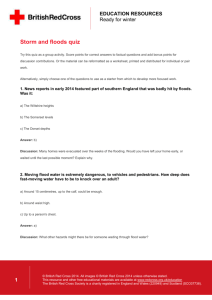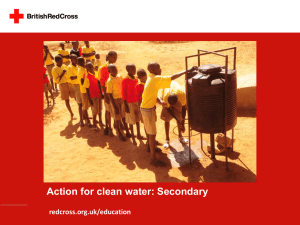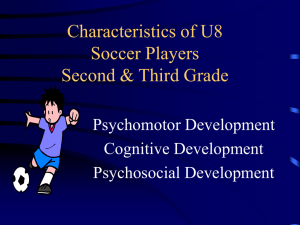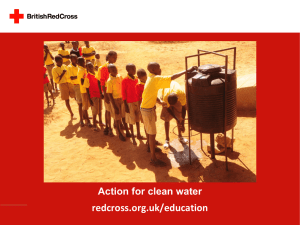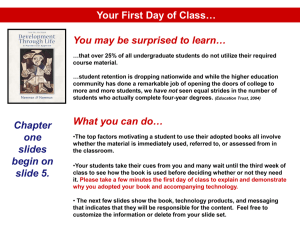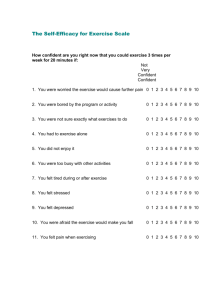Teachers` notes (docx / 923.81 KB)
advertisement
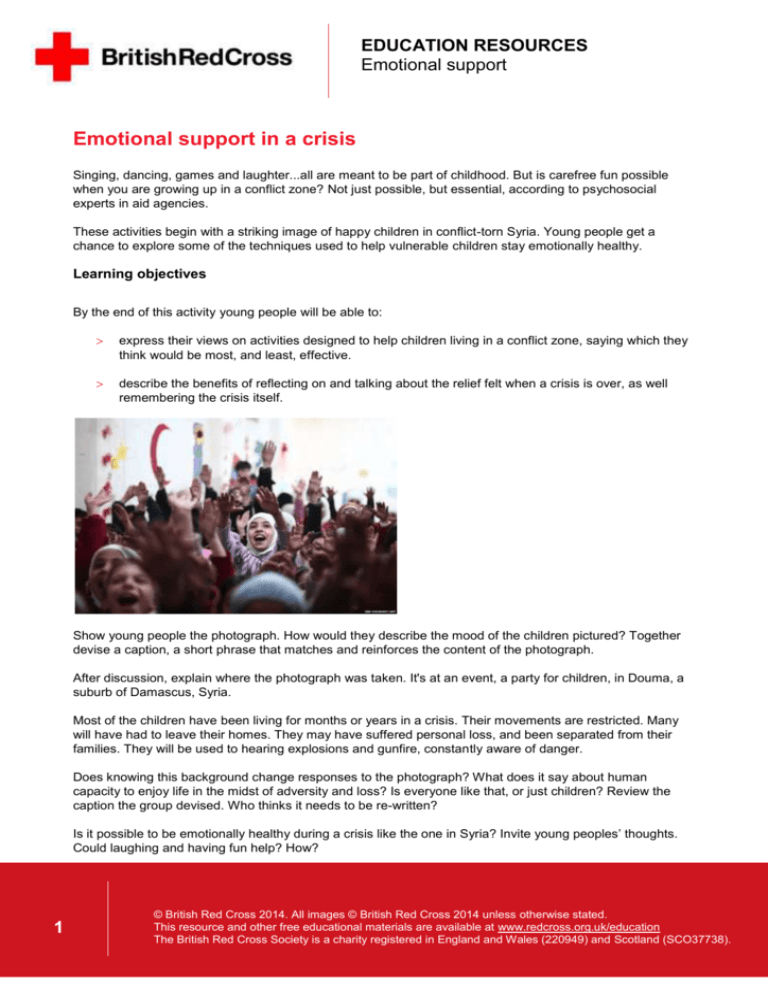
EDUCATION RESOURCES Emotional support Emotional support in a crisis Singing, dancing, games and laughter...all are meant to be part of childhood. But is carefree fun possible when you are growing up in a conflict zone? Not just possible, but essential, according to psychosocial experts in aid agencies. These activities begin with a striking image of happy children in conflict-torn Syria. Young people get a chance to explore some of the techniques used to help vulnerable children stay emotionally healthy. Learning objectives By the end of this activity young people will be able to: express their views on activities designed to help children living in a conflict zone, saying which they think would be most, and least, effective. describe the benefits of reflecting on and talking about the relief felt when a crisis is over, as well remembering the crisis itself. Show young people the photograph. How would they describe the mood of the children pictured? Together devise a caption, a short phrase that matches and reinforces the content of the photograph. After discussion, explain where the photograph was taken. It's at an event, a party for children, in Douma, a suburb of Damascus, Syria. Most of the children have been living for months or years in a crisis. Their movements are restricted. Many will have had to leave their homes. They may have suffered personal loss, and been separated from their families. They will be used to hearing explosions and gunfire, constantly aware of danger. Does knowing this background change responses to the photograph? What does it say about human capacity to enjoy life in the midst of adversity and loss? Is everyone like that, or just children? Review the caption the group devised. Who thinks it needs to be re-written? Is it possible to be emotionally healthy during a crisis like the one in Syria? Invite young peoples’ thoughts. Could laughing and having fun help? How? 1 © British Red Cross 2014. All images © British Red Cross 2014 unless otherwise stated. This resource and other free educational materials are available at www.redcross.org.uk/education The British Red Cross Society is a charity registered in England and Wales (220949) and Scotland (SCO37738). EDUCATION RESOURCES Emotional support Feeling safe Start a discussion with young people about what emotions they might have in a situation where they didn’t feel safe. Compare this with the emotions young people associate with feeling safe. You could run this as a board blast activity. Some people say feeling safe is just that - a feeling. It often isn't directly related to the dangers that are around you. Invite young people to reflect on the statement, "you can help yourself feel safer by changing your attitude." Do they agree or disagree? Discuss together or in small groups. Is there anything in the idea relevant to their own lives? If young people didn’t feel safe how do they think it might affect their everyday lives? Do young people think it is possible for children living in a conflict to feel safe? Which of the following do you think would help children who are living in a conflict zone feel safer? Ask young people to rank them in order from most to least helpful: hearing advice from professionals on the best way to cope being given information about what help is available relaxing by playing games, dancing, singing and not thinking about what happened talking to someone about how you felt during the worst aspect of the crisis being told that other people have suffered more than you have talking to someone about how you felt when you were safe again listening to other people's experiences drawing a picture showing what happened being reassured by adults that everything will be all right The activity above could be run as a group-based diamond ranking exercise. Note: during this activity young people should be encouraged to express their own views whilst being respectful of others. Psychosocial support Humanitarian aid agencies know that people need various kinds of support during, and after, crises caused by armed conflict. They may need shelter, food, water, medicines and so on. They may also need psychosocial support. This technical term refers to a combination of our thoughts and feelings (psycho-) and the way we relate to others, the family, friends and the wider community (-social). These things are important at any time. 2 © British Red Cross 2014. All images © British Red Cross 2014 unless otherwise stated. This resource and other free educational materials are available at www.redcross.org.uk/education The British Red Cross Society is a charity registered in England and Wales (220949) and Scotland (SCO37738). EDUCATION RESOURCES Emotional support After a crisis or emergency, they become even more vital. Survivors have to cope with their own very strong feelings, such as loss, fear, anxiety, anger or sadness. They also have to relate in new ways to other people and groups, as familiar relationships may have changed enormously and suddenly. Psychosocial is an accurate word, but it could be an off-putting and technical one. Challenge young people to come up with a phrase to explain it; one that a younger child could understand. Could they say simply what a psychosocial support worker aims to do? Research online for stimulation. Then and now Experts in psychosocial support have many different ways of helping people cope with traumatic events. One example of an activity used by the Syrian Arab Red Crescent uses LEGO bricks. They encourage people who have lost their home and had to leave behind the life they knew to use building blocks, such as LEGO, to create a model of their old home. They talk about it. Then they destroy the model, or part of it. Then they think about a new home they would like to have. And they build a model of that, and talk about it. Reflect on this activity. Ask young people to say if, and why, they think it could help. How might it be useful for anyone who is adapting to a big change in their life? Saved not shot Show the photograph The man is a volunteer with the Syrian Arab Red Crescent. The scene he created using LEGO took place when he went out to collect the bodies of those who died during armed conflict. He and his team were captured and thought they were to be executed. 3 © British Red Cross 2014. All images © British Red Cross 2014 unless otherwise stated. This resource and other free educational materials are available at www.redcross.org.uk/education The British Red Cross Society is a charity registered in England and Wales (220949) and Scotland (SCO37738). EDUCATION RESOURCES Emotional support The next image shows the moment he and the team were rescued. Look at the second photo and imagine you are the volunteer. What might you have felt after the rescue? What might you have said to friends and family about what happened? Try writing a post for a social media site to let people know how you are. What would you concentrate on? What would be your mood? Reminders about being safe Ea Suzanne Akasha, psychosocial delegate for the Danish Red Cross, uses the LEGO activity above to stress to volunteers the importance of getting children to think beyond the hard times and to focus also on when they felt safe. "Whenever you tell your story in the future, please remember to dwell on the time when you were rescued and felt safe", she says. "If you are reminded of the event, use the same technique and remember when you felt safe. The body and mind need to be consciously reminded that you were and are still safe." Do young people think this technique would be useful for themselves, to help cope after difficult events? What other coping methods could they suggest that might help them during or after a crisis? Credit: Many thanks to Ea Suzanne Akasha and the psychosocial team at the Danish Red Cross for sharing stories, techniques and photographs. 4 © British Red Cross 2014. All images © British Red Cross 2014 unless otherwise stated. This resource and other free educational materials are available at www.redcross.org.uk/education The British Red Cross Society is a charity registered in England and Wales (220949) and Scotland (SCO37738).
